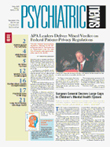For the first time in more than 20 years, the AMA is ready to revise its Principles of Medical Ethics, with changes geared primarily toward emphasizing physicians’ commitment to patient care and access to medical care for everyone. Some of the “minor” wording changes, however, may prove to be controversial.
At the AMA’s Interim Meeting in December, delegates to the AMA approved the language for minor revisions to several of the seven principles and added two additional principles that emphasize patient care and access to medical care.
The revisions, according to the AMA’s bylaws, must now await a final vote before they are adopted, which requires a two-thirds majority of the AMA’s House of Delegates when it votes at its annual meeting in Chicago this June.
“This hasn’t been done in 20 years,” said Herbert Rakatansky, M.D., a gastroenterologist from Rhode Island and the chair of the AMA’s Council on Ethical and Judicial Affairs (CEJA), the group responsible for developing the revisions. “The principles needed updating, but not extensive revision,” he said.
CEJA started working on the revisions in 1997, according to Rakatansky. They collected codes of ethics from state and specialty societies nationwide and from organizations throughout the world. (APA adheres to the AMA’s principles, with specific annotations for psychiatry.) The process also involved holding several forums to listen to opinions about what needed to be updated, deleted, or added.
The resulting revised
Principles of Medical Ethics (
see box below) clarifies that all physicians should provide care with respect not only for human dignity, but also for human rights; that all physicians should maintain a commitment to medical education; and that physicians should contribute to the “betterment of the public health.”
The two new principles require physicians to “regard responsibility to the patient as paramount” and to “support access to medical care for all people.” Rakatansky pointed out that the new principles do not spell out how care for all should be achieved or funded. “We were not trying to be specific, we were trying to give lofty ideas,” Rakatansky said.
Perhaps the most controversial revision to the language of the existing principles was that approved for the second principle. The new wording appears to require physicians to report any colleague who is “deficient in character or competence, or engaging in fraud or deception, to appropriate entities.”
Several delegates testified during the AMA Reference Committee’s hearing on the revisions that the proposed language was “overly burdensome.” One delegate expressed concern during testimony that the new wording could place legal reporting requirements on physicians in states that include adherence to the principles as part of their state’s medical practice rules. “If a doctor doesn’t report a colleague or a partner who, for example, is perhaps billing inappropriately under Medicare or Medicaid regulations, he or she would technically be in violation of the principle,” she testified, “and therefore be in violation of the state’s medical practice act. That could place [such doctors] in jeopardy of losing their license over a relatively common billing problem, which Medicare or Medicaid could technically define as fraud.”
APA’s Ethics Committee will be reviewing the proposed revisions at its March meeting. The Ethics Committee could then forward its recommendations to the AMA Section Council on Psychiatry, which would consider them before its delegates vote on the revisions at the June AMA meeting.
More information on the Principles of Medical Ethics and the changes approved at the AMA’s December meeting are posted on the Web at www.ama-assn.org. ▪
